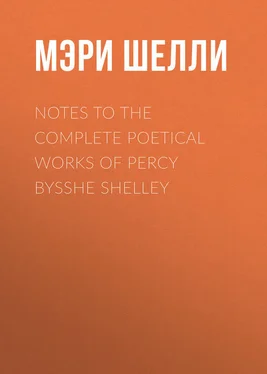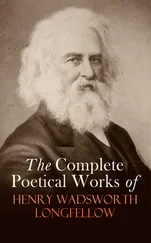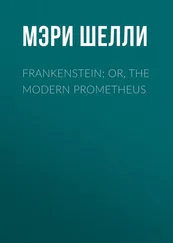Мэри Шелли - Notes to the Complete Poetical Works of Percy Bysshe Shelley
Здесь есть возможность читать онлайн «Мэри Шелли - Notes to the Complete Poetical Works of Percy Bysshe Shelley» — ознакомительный отрывок электронной книги совершенно бесплатно, а после прочтения отрывка купить полную версию. В некоторых случаях можно слушать аудио, скачать через торрент в формате fb2 и присутствует краткое содержание. Жанр: literature_19, foreign_antique, foreign_prose, на английском языке. Описание произведения, (предисловие) а так же отзывы посетителей доступны на портале библиотеки ЛибКат.
- Название:Notes to the Complete Poetical Works of Percy Bysshe Shelley
- Автор:
- Жанр:
- Год:неизвестен
- ISBN:нет данных
- Рейтинг книги:4 / 5. Голосов: 1
-
Избранное:Добавить в избранное
- Отзывы:
-
Ваша оценка:
- 80
- 1
- 2
- 3
- 4
- 5
Notes to the Complete Poetical Works of Percy Bysshe Shelley: краткое содержание, описание и аннотация
Предлагаем к чтению аннотацию, описание, краткое содержание или предисловие (зависит от того, что написал сам автор книги «Notes to the Complete Poetical Works of Percy Bysshe Shelley»). Если вы не нашли необходимую информацию о книге — напишите в комментариях, мы постараемся отыскать её.
Notes to the Complete Poetical Works of Percy Bysshe Shelley — читать онлайн ознакомительный отрывок
Ниже представлен текст книги, разбитый по страницам. Система сохранения места последней прочитанной страницы, позволяет с удобством читать онлайн бесплатно книгу «Notes to the Complete Poetical Works of Percy Bysshe Shelley», без необходимости каждый раз заново искать на чём Вы остановились. Поставьте закладку, и сможете в любой момент перейти на страницу, на которой закончили чтение.
Интервал:
Закладка:
The oppression which, trembling at every nerve yet resolute to heroism, it was his ill-fortune to encounter at school and at college, led him to dissent in all things from those whose arguments were blows, whose faith appeared to engender blame and hatred. 'During my existence,' he wrote to a friend in 1812, 'I have incessantly speculated, thought, and read.' His readings were not always well chosen; among them were the works of the French philosophers: as far as metaphysical argument went, he temporarily became a convert. At the same time, it was the cardinal article of his faith that, if men were but taught and induced to treat their fellows with love, charity, and equal rights, this earth would realize paradise. He looked upon religion, as it is professed, and above all practised, as hostile instead of friendly to the cultivation of those virtues which would make men brothers.
Can this be wondered at? At the age of seventeen, fragile in health and frame, of the purest habits in morals, full of devoted generosity and universal kindness, glowing with ardour to attain wisdom, resolved at every personal sacrifice to do right, burning with a desire for affection and sympathy, – he was treated as a reprobate, cast forth as a criminal.
The cause was that he was sincere; that he believed the opinions which he entertained to be true. And he loved truth with a martyr's love; he was ready to sacrifice station and fortune, and his dearest affections, at its shrine. The sacrifice was demanded from, and made by, a youth of seventeen. It is a singular fact in the history of society in the civilized nations of modern times that no false step is so irretrievable as one made in early youth. Older men, it is true, when they oppose their fellows and transgress ordinary rules, carry a certain prudence or hypocrisy as a shield along with them. But youth is rash; nor can it imagine, while asserting what it believes to be true, and doing what it believes to be right, that it should be denounced as vicious, and pursued as a criminal.
Shelley possessed a quality of mind which experience has shown me to be of the rarest occurrence among human beings: this was his UNWORLDLINESS. The usual motives that rule men, prospects of present or future advantage, the rank and fortune of those around, the taunts and censures, or the praise, of those who were hostile to him, had no influence whatever over his actions, and apparently none over his thoughts. It is difficult even to express the simplicity and directness of purpose that adorned him. Some few might be found in the history of mankind, and some one at least among his own friends, equally disinterested and scornful, even to severe personal sacrifices, of every baser motive. But no one, I believe, ever joined this noble but passive virtue to equal active endeavours for the benefit of his friends and mankind in general, and to equal power to produce the advantages he desired. The world's brightest gauds and its most solid advantages were of no worth in his eyes, when compared to the cause of what he considered truth, and the good of his fellow-creatures. Born in a position which, to his inexperienced mind, afforded the greatest facilities to practise the tenets he espoused, he boldly declared the use he would make of fortune and station, and enjoyed the belief that he should materially benefit his fellow-creatures by his actions; while, conscious of surpassing powers of reason and imagination, it is not strange that he should, even while so young, have believed that his written thoughts would tend to disseminate opinions which he believed conducive to the happiness of the human race.
If man were a creature devoid of passion, he might have said and done all this with quietness. But he was too enthusiastic, and too full of hatred of all the ills he witnessed, not to scorn danger. Various disappointments tortured, but could not tame, his soul. The more enmity he met, the more earnestly he became attached to his peculiar views, and hostile to those of the men who persecuted him.
He was animated to greater zeal by compassion for his fellow-creatures. His sympathy was excited by the misery with which the world is burning. He witnessed the sufferings of the poor, and was aware of the evils of ignorance. He desired to induce every rich man to despoil himself of superfluity, and to create a brotherhood of property and service, and was ready to be the first to lay down the advantages of his birth. He was of too uncompromising a disposition to join any party. He did not in his youth look forward to gradual improvement: nay, in those days of intolerance, now almost forgotten, it seemed as easy to look forward to the sort of millennium of freedom and brotherhood which he thought the proper state of mankind as to the present reign of moderation and improvement. Ill-health made him believe that his race would soon be run; that a year or two was all he had of life. He desired that these years should be useful and illustrious. He saw, in a fervent call on his fellow-creatures to share alike the blessings of the creation, to love and serve each other, the noblest work that life and time permitted him. In this spirit he composed "Queen Mab".
He was a lover of the wonderful and wild in literature, but had not fostered these tastes at their genuine sources – the romances and chivalry of the middle ages – but in the perusal of such German works as were current in those days. Under the influence of these he, at the age of fifteen, wrote two short prose romances of slender merit. The sentiments and language were exaggerated, the composition imitative and poor. He wrote also a poem on the subject of Ahasuerus – being led to it by a German fragment he picked up, dirty and torn, in Lincoln's Inn Fields. This fell afterwards into other hands, and was considerably altered before it was printed. Our earlier English poetry was almost unknown to him. The love and knowledge of Nature developed by Wordsworth – the lofty melody and mysterious beauty of Coleridge's poetry – and the wild fantastic machinery and gorgeous scenery adopted by Southey – composed his favourite reading; the rhythm of "Queen Mab" was founded on that of "Thalaba", and the first few lines bear a striking resemblance in spirit, though not in idea, to the opening of that poem. His fertile imagination, and ear tuned to the finest sense of harmony, preserved him from imitation. Another of his favourite books was the poem of "Gebir" by Walter Savage Landor. From his boyhood he had a wonderful facility of versification, which he carried into another language; and his Latin school-verses were composed with an ease and correctness that procured for him prizes, and caused him to be resorted to by all his friends for help. He was, at the period of writing "Queen Mab", a great traveller within the limits of England, Scotland, and Ireland. His time was spent among the loveliest scenes of these countries. Mountain and lake and forest were his home; the phenomena of Nature were his favourite study. He loved to inquire into their causes, and was addicted to pursuits of natural philosophy and chemistry, as far as they could be carried on as an amusement. These tastes gave truth and vivacity to his descriptions, and warmed his soul with that deep admiration for the wonders of Nature which constant association with her inspired.
He never intended to publish "Queen Mab" as it stands; but a few years after, when printing "Alastor", he extracted a small portion which he entitled "The Daemon of the World". In this he changed somewhat the versification, and made other alterations scarcely to be called improvements.
Some years after, when in Italy, a bookseller published an edition of "Queen Mab" as it originally stood. Shelley was hastily written to by his friends, under the idea that, deeply injurious as the mere distribution of the poem had proved, the publication might awaken fresh persecutions. At the suggestion of these friends he wrote a letter on the subject, printed in the "Examiner" newspaper – with which I close this history of his earliest work.
Читать дальшеИнтервал:
Закладка:
Похожие книги на «Notes to the Complete Poetical Works of Percy Bysshe Shelley»
Представляем Вашему вниманию похожие книги на «Notes to the Complete Poetical Works of Percy Bysshe Shelley» списком для выбора. Мы отобрали схожую по названию и смыслу литературу в надежде предоставить читателям больше вариантов отыскать новые, интересные, ещё непрочитанные произведения.
Обсуждение, отзывы о книге «Notes to the Complete Poetical Works of Percy Bysshe Shelley» и просто собственные мнения читателей. Оставьте ваши комментарии, напишите, что Вы думаете о произведении, его смысле или главных героях. Укажите что конкретно понравилось, а что нет, и почему Вы так считаете.












